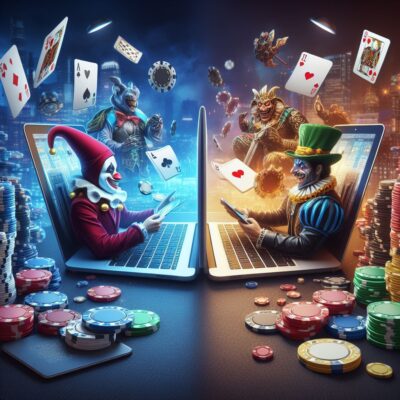Digital vs. Felt: The Impact of Online Gaming on Casino Poker
The advent of online gaming has revolutionized many traditional activities, Online Gaming on Casino Poker and poker is no exception. The digital era has introduced a dynamic shift from the classic felt tables of casino poker rooms to virtual platforms, where players from around the world can convene and compete with just a few clicks. This transformation has had significant implications for how the game is played, perceived, and evolved over the years.
The Rise of Online Poker
Online poker began gaining traction in the early 2000s, fundamentally altering the poker landscape. Platforms such as PokerStars and Full Tilt Poker made it possible for anyone with an internet connection to engage in the game, Online Gaming on Casino Poker significantly lowering the barriers to entry as compared to traditional casino poker. The accessibility of online poker has democratized the game, allowing players of all skill levels to participate, learn, and improve without the intimidation of sitting down at a physical table with more experienced players.
Skill Development and Accessibility
One of the most significant impacts of online poker is how it has changed the way players develop their skills. Online platforms offer a vast array of tools and resources, including poker software, real-time statistics, and interactive tutorials that help players analyze their play and improve their strategies. Moreover, with the ability to play multiple tables simultaneously, Online Gaming on Casino Poker online poker provides a much faster pace of play, which can accelerate learning and experience.
The global accessibility of online poker also means that players are exposed to a wider range of playing styles and strategies than they would typically encounter in a single casino. This exposure can lead to a more comprehensive understanding of poker, contributing to the overall skill level and sophistication of the player pool.
Economic Implications
The economic impact of online poker on traditional casinos has been profound. Initially, many in the casino industry feared that the convenience of online play would reduce foot traffic to live poker rooms. However, over time, it has become apparent that online poker can also serve as a complement to traditional play, introducing new players to the game and encouraging them to experience live poker in a casino setting.
Furthermore, the integration of online and live platforms by many casinos has helped bridge the gap between digital and felt experiences. Many casinos now host online qualifiers for live tournaments, which not only helps fill seats but also increases prize pools and overall interest in event participation.
Changes in Player Dynamics and Behavior
Online poker has influenced player behavior and dynamics at the felt tables. Players who start online and transition to live games often bring different strategies and a different pace of play, which can be both an advantage and a challenge. Online players are generally more aggressive and statistically driven, given the tools available to them. This style can disrupt traditional dynamics at the casino, forcing live players to adapt and rethink their strategies.
The Social Aspect
While online poker offers convenience and a range of tools for skill enhancement, it lacks the direct human interaction of a live poker game. The psychological aspects of poker, such as bluffing and reading physical tells, are diminished in the online setting. However, for many players, the social experience of live poker is irreplaceable. The camaraderie, face-to-face interactions, and the tactile sensation of chips and cards are integral to the traditional poker experience.
Conclusion
The impact of online gaming on casino poker has been multifaceted, influencing everything from player skill development and economic models to game dynamics and social interactions. While online poker continues to grow and evolve, it does not necessarily spell the end for traditional live games in casinos. Instead, the relationship between digital and felt poker is synergistic, with each platform offering unique advantages that can enhance the overall appeal and experience of the game. Whether through a screen or around a table, poker remains an enduring and evolving testament to the complex interplay of skill, strategy, and human interaction.
